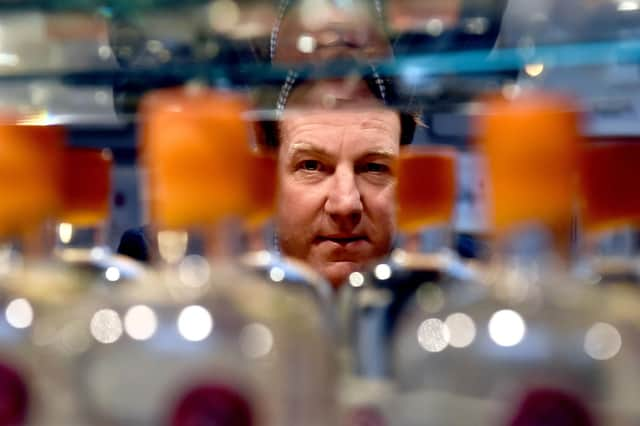The importance of balancing purpose and profit - comment


As Covid-19 continues to wreak havoc on economies worldwide, it’s becoming increasingly clear that we need to think radically about how Scotland is to recover from what could be the largest economic contraction in history.
We all have a part to play in the rebuilding job. However, there’s surely an opportunity for businesses that have an ability to innovate at scale and place to play a decisive role in building an economy that now must place equal emphasis on people, planet and profits.
Advertisement
Hide AdAdvertisement
Hide AdAsking business leaders to prioritise purpose may seem futile with so many laying off staff and trying to reconstruct supply chains in order to stay alive. Defining a company’s impact in the wider world might be near the bottom of the to-do list. However, there has never been a stronger case for a more compassionate capitalism that seeks the good of people and the planet, not just profits.
The pandemic is immutably changing the way we live and work and setting new parameters for what success now looks like. One of the most significant changes is the role of business in society. Since lockdown began, businesses have been redefining their brand purpose and the positive role they can play in the national effort to mitigate the effects of coronavirus.
So many companies have pivoted and redeployed their capabilities to respond to the crisis. Scotland has its own shining examples. Edinburgh’s Pickering’s Gin set aside its production plans to mass-produce hand-sanitiser for front-line workers, while Annan-based personal protective equipment manufacturer Alpha Solway produced 20,000 face visors per day for the NHS.
While the primary purpose has in most cases been altruistic, the reputational benefits of these acts of kindness shouldn’t go amiss. Even businesses that didn’t court publicity will have benefited from creating a positive impression on their customers, building brand loyalty that will live for years. Key to understanding the role of purpose in business is to acknowledge the value of proactively managing reputation.
Purpose
Positive reputation propels performance, and one of the fundamental drivers of reputation is purpose. In 2019, a study by RepTrak cited purpose as the most important topic for chief communications officers globally, as they try to manage their reputation and help their companies thrive.
In the age of the “reputation economy” where business actions are under greater scrutiny than ever, Covid-19 will have posed the greatest test of all.
Good reputations will be earned (or blown) based on their actions in the eyes of customers, staff, stakeholders and shareholders, with a direct impact on business success and failure. As lockdown eases, businesses will need to do some soul-searching and decide just who and what they want to be.
What should their purpose be when the purpose of so many, recently, has been survival? Is it business as usual, or do they seize the opportunity to recalibrate and deliver a more benevolent social impact? The easier path may be the former, however those who take a longer view will benefit most.
Advertisement
Hide AdAdvertisement
Hide AdBalancing people and profit isn’t new. However, pressure has been building on business for some time to move beyond lip service into action. In recent years, many larger corporates have made great progress in better balancing their responsibility to maximise profits for shareholders with a desire to find a purpose across environment, social, and governance themes.
When the stakes are so high, the very best leaders have understood the value of reputation and restructured their principles of business as part of a longer-term strategy. Yet the exemplars have always been the exception rather than the rule.
Here in Scotland, we have a golden opportunity to rebuild our economy with purpose at its core. Setting aside the opportunity provided by the pandemic to reframe the role of business, there are two major factors in our favour.
Scotland has a thriving entrepreneurial ecosystem that is considered one of the most ambitious within the UK. At the heart of this are many socially-conscious entrepreneurs with a will to do good and the talent and drive to make it happen.
The second major factor is our favourable political climate. Only in January this year, the First Minister argued for an economy focusing on wellbeing to tackle the challenges of our time.
With a political imperative to focus on wellbeing alongside gross domestic product, combined with the ability and agility of our business community, there is hope we can emerge from the wreckage of Covid-19 with a collective ambition to build a more sustainable economy and a healthier, wealthier and fairer nation.
A message from the Editor:
Thank you for reading this story on our website. While I have your attention, I also have an important request to make of you.With the coronavirus lockdown having a major impact on many of our advertisers - and consequently the revenue we receive - we are more reliant than ever on you taking out a digital subscription.Subscribe to scotsman.com and enjoy unlimited access to Scottish news and information online and on our app. With a digital subscription, you can read more than 5 articles, see fewer ads, enjoy faster load times, and get access to exclusive newsletters and content. Visit https://www.scotsman.com/subscriptions now to sign up.
Our journalism costs money and we rely on advertising, print and digital revenues to help to support them. By supporting us, we are able to support you in providing trusted, fact-checked content for this website.
Joy Yates
Editorial Director
Comments
Want to join the conversation? Please or to comment on this article.